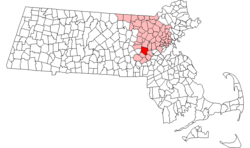Framingham
| Framingham, Massachusetts | ||
|---|---|---|
| Town | ||

The Museum at the Framingham History Center
|
||
|
||
 Location in Middlesex County in Massachusetts |
||
| Coordinates: 42°16′45″N 71°25′00″W / 42.27917°N 71.41667°WCoordinates: 42°16′45″N 71°25′00″W / 42.27917°N 71.41667°W | ||
| Country | United States | |
| State | Massachusetts | |
| County | Middlesex | |
| Settled | 1650 | |
| Incorporated | 1700 | |
| Government | ||
| • Type | Representative town meeting | |
| Area | ||
| • Total | 26.4 sq mi (68.5 km2) | |
| • Land | 25.1 sq mi (65.1 km2) | |
| • Water | 1.3 sq mi (3.4 km2) | |
| Elevation | 165 ft (50 m) | |
| Population (2010) | ||
| • Total | 68,318 | |
| • Density | 2,581.1/sq mi (995.2/km2) | |
| Time zone | Eastern (UTC−5) | |
| • Summer (DST) | Eastern (UTC−4) | |
| ZIP code | 01701, 01702, 01703, 01704, 01705 | |
| Area code(s) | 508 / 774 | |
| FIPS code | 25-24925 | |
| GNIS feature ID | 0618224 | |
| Website | www.framinghamma.gov/ | |
Framingham (IPA: /ˈfreɪmɪŋˌhæm/) is a town in Middlesex County, Massachusetts, United States. The population was 68,318 as of the United States 2010 Census, making it the 14th most populous municipality in Massachusetts. Founded in 1700, Framingham was placed at # 36 on 'Best Places to Live in US' by CNN Money magazine in 2012.
Framingham, sited on the ancient trail known as the Old Connecticut Path, was first settled when John Stone settled on the west bank of the Sudbury River in 1647. In 1660, Thomas Danforth, an official of the Bay Colony, formerly of Framlingham, Suffolk, received a grant of land at "Danforth's Farms" and began to accumulate over 15,000 acres (100 km2). He strenuously resisted petitions for incorporation of the town, which was officially incorporated in 1700, following his death the previous year. Why the "L" was dropped from the new town's name is not known. The first church was organized in 1701, the first teacher was hired in 1706, and the first permanent schoolhouse in 1716.
On February 22, 1775, the British general Thomas Gage sent two officers and an enlisted man out of Boston to survey the route to Worcester, Massachusetts. In Framingham those spies stopped at Buckminster's Tavern. They watched the town militia muster outside the building, impressed with the men's numbers but not their discipline. Though "the whole company" came into the tavern after their drill, the officers managed to remain undetected and continued on their mission the next day. Gage did not order a march along that route, instead ordering troops to Concord, Massachusetts, on April 18–19. Framingham sent two militia companies totaling about 130 men into the Battles of Lexington and Concord that followed; one of those men was wounded.
...
Wikipedia

